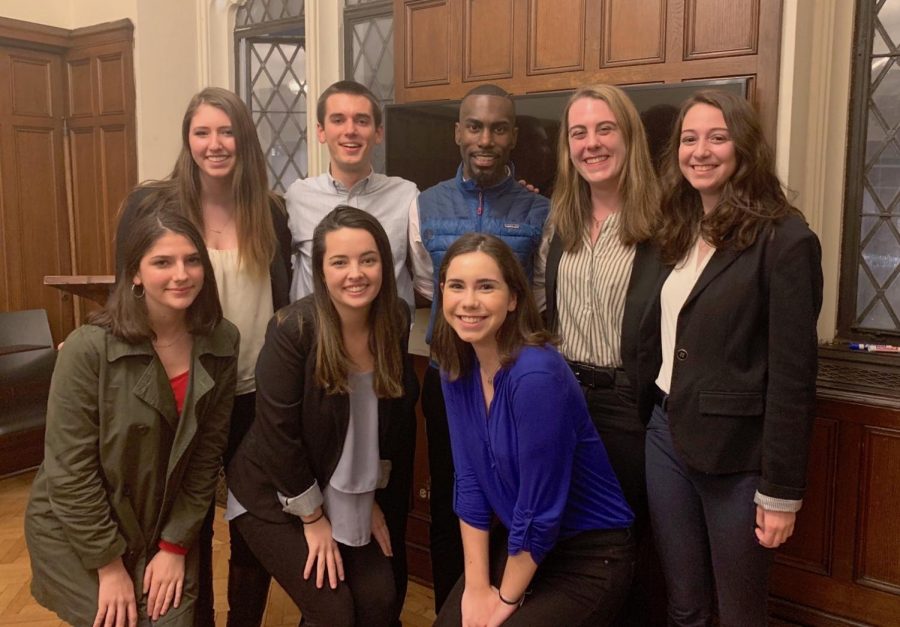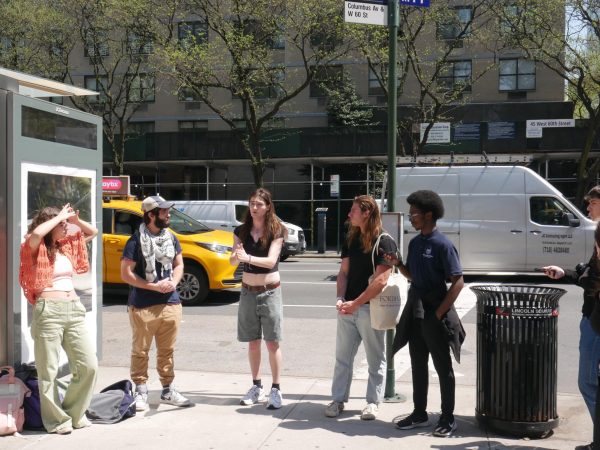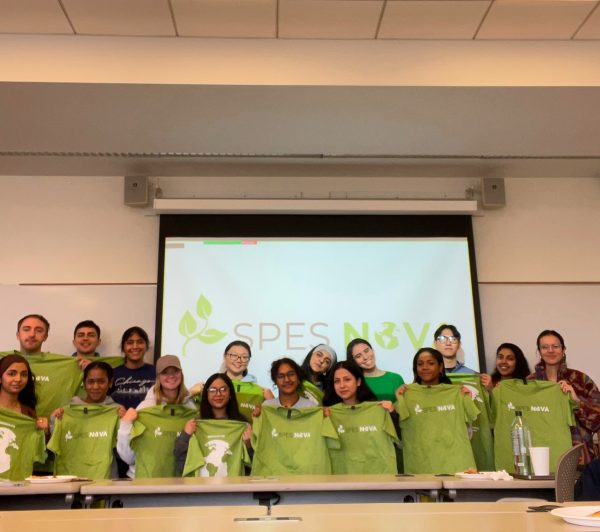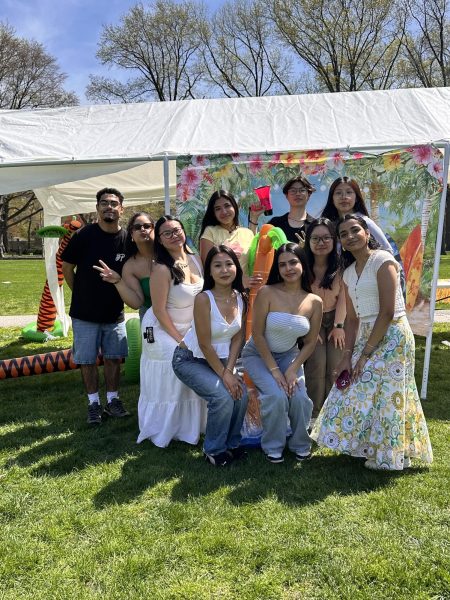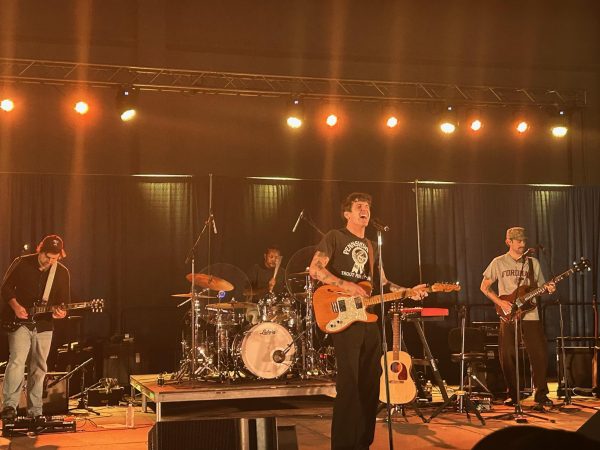Fordham College Democrats Host DeRay Mckesson
By Helen Stevenson
For their annual speaker event on Monday, Nov. 26, the College Democrats hosted civil rights activist DeRay Mckesson, a leading voice in the Black Lives Matter movement, host of the podcast “Pod Save the People” and author of “On the Other Side of Freedom: The Case for Hope.” He is an active participant in protests for civil rights across the country, focusing primarily on issues of innovation, equity and justice.
Mckesson has a strong social media presence and is most recognizable by his iconic blue vest — the vest even has its own Twitter account, with over 9,000 followers.
President of the College Democrats Sophia MacMaster, FCRH ’21, said the College Democrats came in contact with Mckesson through the talent agency All American Talent.
“I’ve heard him on his podcast and I thought he was really interesting,” MacMaster said. “I also felt like he had a different perspective than speakers we’ve had recently.”
According to Mckesson, the message of his book, On the Other Side of Freedom, is an effort to engage in positive conversations about what freedom would look like for people of color.
“One of the reasons why I think about this in the frame of ‘what is on the other side of freedom’ is that we spend so much time thinking about what is on this side of freedom that I worry sometimes that we don’t think about how to get to the other side,” Mckesson said.
Throughout his speech, Mckesson separated his message into nine distinct goals to advance the fight to achieve greater civil rights for people of color and marginalized communities.
The first read, “We create entrances and on-ramps.” As an organizer, Mckesson said he has the responsibility to get people involved in a way that they can understand.
“When I think about the messaging work that I am engaged in, my bar is always: could I explain this to my aunt?” he said. “It’s not that my aunt is stupid, but my aunt isn’t watching CNN all day. Part of our work as organizers is to not be so arrogant to think the only way to enter an issue is the way we enter the issue.”
His next point was titled, “We share the cognitive burden.” Here, Mckesson described a tactic he uses to engage in meaningful conversations with people that share a different belief system. Instead of focusing on giving a speech, he advises asking meaningful questions that engage the other person.
“Part of our work is that we share a cognitive burden, so you’re not the only person doing work,” he said. “So much of what you can do that is really helpful is actually asking thoughtful questions. Instead of me trying to give a speech of the century, I want you do to a little work.”
For section three, he said, “We understand truth and reconciliation.” Mckesson explained that in order to work towards freedom and reconciliation, people must first recognize the history of marginalization of people of color in the United States.
“A lot of people want to get to the reconciliation part without actually dealing with the truth part. We have to force people to deal with the truth on the front end,” he said. “There is no way to reconcile without thinking about why we got here in the first place.”
His next point read, “We never let the system off the hook.” In order to change a problem in the United States, we must realize that the problem is systemic.
“The reason why we need another after-school program is that we didn’t teach people how to read and write in school in the first place,” he said. “So when we think about how to fix things we are always focused on things at the root level. As long as we let people off the hook at a system level, we will always lose.”
Next, he read, “We live and plan in the real world, not the abstract.” Mckesson said that in order to represent Americans, politicians must understand the fact that their policies will have real-world impacts on the people they represent.
He continued, “We understand the constraints as present not permanent.” He explained that although growing up in a marginalized community means understanding social and political constraints, these constraints will not always be present.
“Part of what it means to grow up is to understand that the constraints exist today but they don’t have to exist always,” he said. “When we think about freedom, it is not only the absence of bad things. It has to be the presence of good things, too; not the absence of oppression, but the presence of justice and joy.”
The next point read, “We know that every story is a lesson in power.” Mckesson said that the movement is mindful that all of the stories they tell are communicating a lesson in power, specifically the power of the government.
“As long as we continue to tell stories about what the problem is and what the problem isn’t, that don’t focus on the system of power, we will always lose,” he said.
For the eighth tenet, he said, “We understand the limits of empathy.” He explains that the movement for civil rights must not be based on empathy alone.
“When we only rely on empathy, it only works when the power dynamic is shared,” he said. “When the power dynamic isn’t shared, it just becomes voyeurism into the pain of other people.”
Lastly, he said, “We preach to the choir.” Mckesson said people are constantly asking him what he is doing to reach “across the aisle” to people with different political views. However, he responded that he is not interested in those people right now.
“I am interested in preaching to the choir,” said Mckesson. “I want to build the biggest choir that we have. The question becomes, can we organize them? Can we get as many people singing the same song with the same messages as possible?”
MacMaster said that his speech exceeded the high expectations she had for this event.
“He did a really good job of putting issues into terms that were easy to understand and he definitely made me think about things in a way I never had,” she said. “Also he’s speaking from experience and he’s done the work towards the things he believes in. . . I think DeRay inspired a lot of students.”
Michael Fissinger, vice president of the College Democrats, said Mckesson’s message perfectly aligns with the values of the College Democrats and they are grateful they could have him as this year’s speaker.
“Ultimately, his main point was that if we want to accomplish a world where everyone has access to healthcare, the economy works for all of us and not just wealthy individuals, and each child has an equal opportunity at success, we must first understand why we haven’t gotten there,” he said. “By understanding ‘this side of freedom,’ as DeRay calls it, we can get to ‘the other side of freedom.’”



































































































































































































